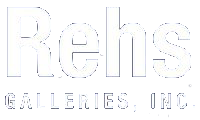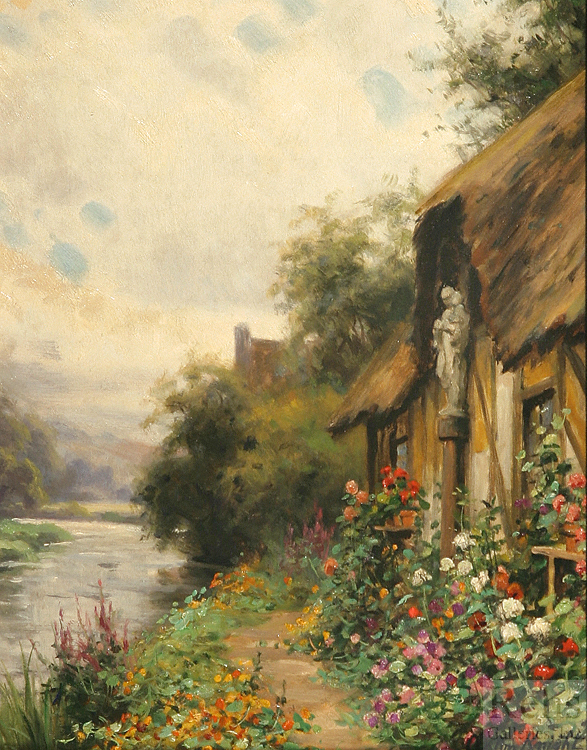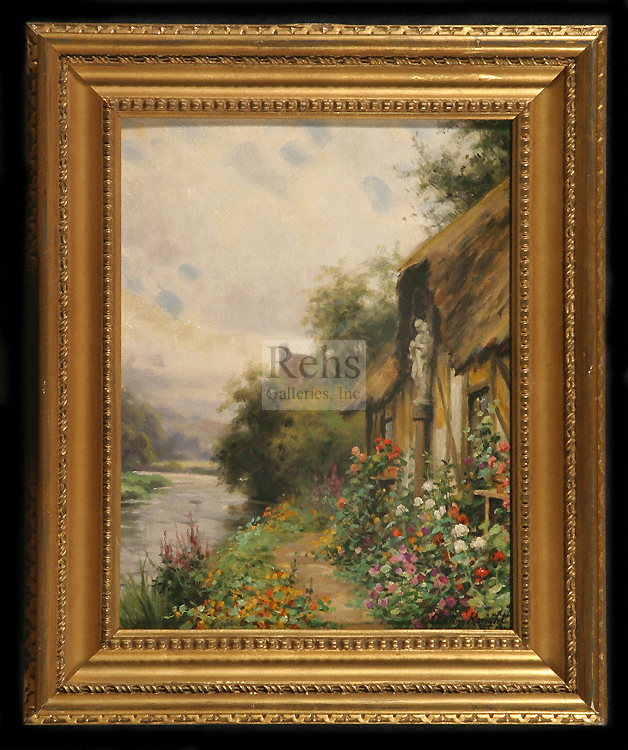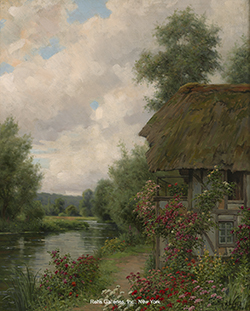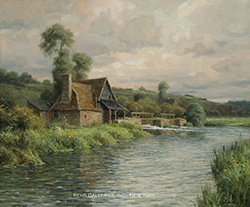Louis Aston Knight
(1873 - 1948)
Cottage by the River
Oil on panel
13 3/4 x 10 1/2 inches
Framed dimensions:
18 x 14 3/4 inches
Signed and inscribed Paris
BIOGRAPHY - Louis Aston Knight (1873 - 1948)
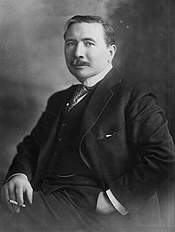
Louis Aston Knight was the son of the American expatriate painter Daniel Ridgway Knight. Daniel Ridgway Knight was born in America and began studying art at the Pennsylvania Academy of Art. In 1872, he traveled to Paris and continued to study at the Ecole des Beaux-Arts. After that, he remained in Europe and studied in the academic studios of the Romantic Salon painters Jules Ernst Meissonier and Charles Gleyre and the Impressionists Pierre Auguste Renoir and Alfred Sisley. Although Ridgway Knight spent most of his life in Europe, his American style and technique show through. This typically American approach towards painting also influenced Louis Aston Knight.
In 1873, Louis Aston Knight was born in Paris. Unlike his father, Aston Knight was raised and educated in Europe. Knight attended the Chigwell School in England for his Liberal Arts Education and began his artistic training under the guidance of his father. Later, he studied formally with the great French Romantic painters Robert-Fleury and Jules Lefebvre.
In 1894 Aston Knight debuted at the Paris Salon, starting a highly acclaimed career. Among his many awards, he won a Bronze medal at the Paris Exposition Universelle in 1900, an honorable mention at the Paris Salon in 1901, a gold medal in Lyon in 1903, a gold medal in Geneva and Nantes in 1904, and Gold medals at the Paris Salon in both 1905 and 1906, earning him the title Hors concours as the first American to win two gold medals at the Salon in two consecutive years. Knight was also made a knight of the Legion of Honor in 1924, becoming an officer in 1928 and eventually a commander in 1934.
Louis Aston Knight is most famous for his French landscapes. You will not find figures in his work due to an agreement that he made with his father to keep their work from looking too similar. This was, however, unnecessary because their work is very different. Ridgway Knight painted tightly, while Aston Knight's work shows a much stronger influence of the Impressionists with whom he was friendly.
Aston looked up to Claude Monet and visited him occasionally at his home in Giverny. He was particularly impressed with Monet's gardens and strove to cultivate a garden as beautiful as the master's. Knight also awarded prizes yearly to the neighboring peasants who kept the nicest gardens. This ensured that he had good models for his cottage landscape paintings.
Gradually, Aston Knight became well known in the New York art scene and began to do some of his work in the States. In 1911, Knoedler and Co. held an exhibition of his landscapes of the U.S.A. and France. His exhibition at the Levy Gallery in New York in 1931 attracted much attention. In fact, "Art News" critiqued the show (26 December issue) and described his fame and plein-air approach:
A group of new landscapes by Aston Knight, the popular painter of the Normandy Riverscape, is the Holiday attraction at the Levy Gallery. Mr. Knight sticks closely to his well established formula, doubtless due to the tremendous acclaim acquired in his earlier years when Hopkinson Smith publicized him as the "painter in the high rubber boots" for Mr. Knight was not content with studying the action of the Normandy streams from the comfortable banks.... used to do on a pair of waist-high rubber boots and setting up his easel in mid-stream, paint the purling waters at first hand.
Aston Knight was a favorite of American presidents in his day. In 1922, President Harding purchased a Louis Aston Knight to hang in the White House, and President Coolidge held a private exhibition of Knight's work during his presidency.
Many of his works have had international acclaim and are housed in the art collections of the Picker Art Gallery, Colgate University; Strong Museum, Rochester, New York; Virginia Museum of Fine Arts, Richmond, VA.; and the Hudson River Museum of Westchester.
Exhibitions:
Knoedler & Co., N.Y., Dec 26, 1911 – Jan 6, 1912
Detroit Museum of Art, March 18 – 30, 1914
Memorial Art Gallery, Rochester, NY, May 1918
J. Levy Galleries, N.Y., Nov. 25 – Dec. 7, 1935
| AVAILABLE WORKS | |||
